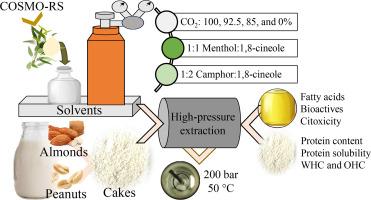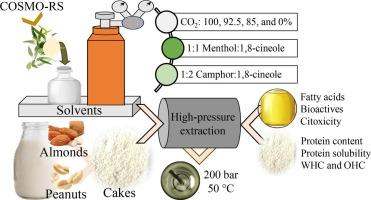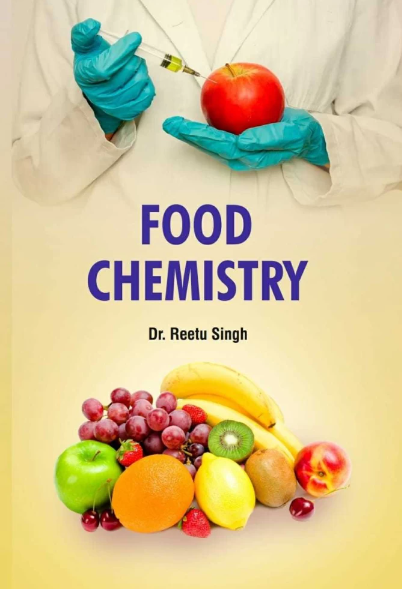Sustainable valorization of almond and peanut plant-based milk cakes: The use of terpenoid mixtures as ready-to-use solvents to enhance supercritical CO2 extraction
IF 9.8
1区 农林科学
Q1 CHEMISTRY, APPLIED
引用次数: 0
Abstract
The solid cake from plant-based milk production, rich in lipids and proteins, can be repurposed to recover valuable fractions suitable for food, cosmetics, and pharmaceutical applications. This innovative study explored terpenoid-based solvents as modifiers of supercritical CO2 extractions to obtain ready-to-use extracts rich in fatty acids, bioactive compounds, and a protein concentrate derived from almond and peanut biorefinery. The natural mixtures of 1:1 menthol:1,8-cineole (ME:EU) and 1:2 camphor:1,8-cineole (CA:EU) used at concentrations of 7.5 and 15 % increased bioactive compounds and lipids yield, outperforming other extraction methods. The phase transition of the system CO2 and ME:EU shows a homogeneous liquid phase, contributing to solvation power and extraction yield. The ME:EU and CA:EU extracts presented low cytotoxicity to human kidney HK-2 cells, showing potential for ready-to-use purposes. The extraction method had little effect on the functional properties of the proteins. Moreover, the continued supercritical CO2 extraction allowed solvent remotion and reuse.


杏仁和花生植物乳饼的可持续增值:使用萜类混合物作为即用型溶剂来提高超临界二氧化碳萃取的效果
从植物性牛奶生产的固体蛋糕,富含脂质和蛋白质,可以重新利用,回收有价值的馏分,适用于食品,化妆品和制药应用。这项创新的研究探索了萜类溶剂作为超临界CO2萃取物的改性剂,以获得富含脂肪酸、生物活性化合物和从杏仁和花生生物精炼中提取的蛋白质浓缩物的即用提取物。1:1薄荷醇:1,8-桉树脑(ME:EU)和1:2樟脑:1,8-桉树脑(CA:EU)的天然混合物在浓度为7.5%和15% %时增加了生物活性化合物和脂质产量,优于其他提取方法。体系中CO2和ME:EU的相变呈均匀液相,有利于溶剂化力和萃取率的提高。ME:EU和CA:EU提取物对人肾HK-2细胞具有低细胞毒性,显示出随时可用的潜力。提取方法对蛋白质的功能性质影响不大。此外,持续的超临界CO2萃取允许溶剂去除和再利用。
本文章由计算机程序翻译,如有差异,请以英文原文为准。
求助全文
约1分钟内获得全文
求助全文
来源期刊

Food Chemistry
工程技术-食品科技
CiteScore
16.30
自引率
10.20%
发文量
3130
审稿时长
122 days
期刊介绍:
Food Chemistry publishes original research papers dealing with the advancement of the chemistry and biochemistry of foods or the analytical methods/ approach used. All papers should focus on the novelty of the research carried out.
 求助内容:
求助内容: 应助结果提醒方式:
应助结果提醒方式:


